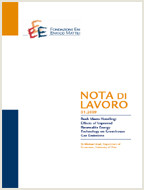Do International Roaming Alliances Harm Consumers?

31.08.2009
Benno Bühler
D43, L13, L42, L96
International Roaming, Vertical Relations, Regulation
Economy and Society
Fausto Panunzi
We develop a model of international roaming in which mobile network operators (MNOs) compete both on the wholesale market to sell roaming services to foreign operators and on the retail market for subscribers. The operators own a network infrastructure only in their home country. To allow their subscribers to place or receive calls abroad, they have to buy roaming services provided by foreign MNOs. We show that in absence of international alliances and capacity restrictions, competition between foreign operators would drive wholesale unit prices down to marginal costs. However, operators prefer to form international alliances in which members mutually provide roaming services at inefficiently high wholesale prices. Alliances serve as a commitment device to soften competition on the retail market and harm consumers through excessively high per call prices. Although operators compete in two-part tariffs for subscribers, wholesale roaming prices do not exhibit profit-neutrality as do access prices in related models of net- work interconnection. We also show that international alliances are endogenously formed if not prevented by regulation.
